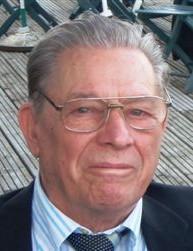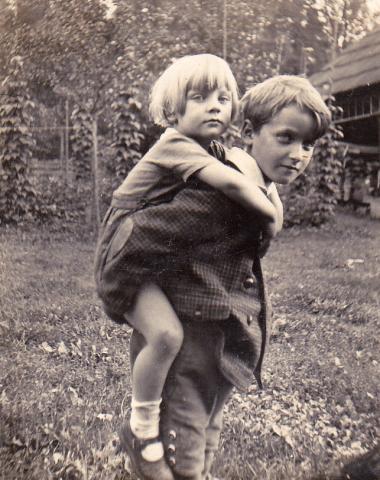The Passing of an Era – Remembering Willy Wenger 1926-2017
 I AM EXTREMELY SAD TO REPORT THE DEATH OF MY DEAR FRIEND AND COLLABORATOR, WILLY WENGER. Willy died of heart failure on Thursday, JULY 20 (the 73rd anniversary of the attempted assassination of Adolf Hitler known as Operation Valkyrie) at home in Austria. He was 91. I was informed by his family - his daughter Sonia and his wife of over 60 years, Wilma.
I AM EXTREMELY SAD TO REPORT THE DEATH OF MY DEAR FRIEND AND COLLABORATOR, WILLY WENGER. Willy died of heart failure on Thursday, JULY 20 (the 73rd anniversary of the attempted assassination of Adolf Hitler known as Operation Valkyrie) at home in Austria. He was 91. I was informed by his family - his daughter Sonia and his wife of over 60 years, Wilma.
I like the picture at left (taken when he was 87) because I think it shows the strength of this man and the sorrow and loss he endured in his life ... but with a buoyant heart.
Willy had his share of health problems during the last few years, but carried on valiantly to keep up with all his contacts and commitments. Though short in physical stature, he had a great, even towering, spirit within him. He loved his family, his country and his friends, and never turned down a request to serve them. It was my privilege to have known him.
I met Willy through Willi Kriessmann. Willi was translating into English Willy Wenger's story of his experience trapped in Berlin at the very end of WWII. He told me Wenger had a hero brother, the pilot “Bibi” Wenger, who had been killed in 1945, and sent me Bibi's picture. I was impressed by his youth and poignant good looks. But I kept confusing Willy Wenger with Willy Wonka (and the Chocolate Factory) and had trouble, therefore, remembering the name.
Willi K. said I should read his story when he completed translating it and I should also talk to Willy. But I was preoccupied with my Elie Wiesel exposure/web site at that time and did not want to take on another editing project. On a trip to Austria in May 2012, Willi K. made a special detour to visit Wenger and his wife at their home in Bad Gleichenberg in Styria (Southeastern Austria). It was good he did because only a month later, back home in California, Willi suffered a major stroke (which in my opinion the stresses of that trip contributed to) and on December 18th that year, he passed away at the age of 93.
I posted a heartfelt essay, “Remembering Willi Kriessmann” here at carolynyeager.net and received a gracious email from Willy Wenger thanking me for it, along with a photo of the two of them taken during the visit. I was really cheered to hear from him and we began a regular and fruitful communication that continued right up to his own death last week.
It was, of course, through Willy that I was able to add the very valuable section “Wenger Family Archive” to this web site. My love for these two Austrians is deep, along with my gratitude for their wonderful friendship and the working partnership I enjoyed with each of them. Both had a love of reading/writing and a natural talent for it. Together we made available to English language readers much of the way it really was during the National Socialist period in Austria and Germany.
Left: Three year old Willy carried piggy-back by his beloved brother "Bibi" (Leopold), 7, probably at the Bad Gleichenberg family home in August 1929.
Willy Wenger was born on May 6, 1926 in Anger, Austria. At the age of three, he moved with his parents and older brother to Leoben, where he grew up and went to school during the economically difficult days between the wars. His father was a German-Austrian nationalist and the whole family was enthusiatic about Adolf Hitler, with both sons joining the Hitler Youth and volunteering for war service. In the spring of 1939, Bibi and his best friend Gilbert Geisendorfer applied for entrance to the Napola school in Pomerania, passed the tests, and became Air Force officer trainees. Willy followed his brother's career avidly through his letters and visits home, and dreamed of becoming a pilot himself. In April 1943 at age 17 (almost), he earned his air pilot license at the Reichssegelflugschule Spitzerberg near Vienna. Before he finished his last year of high school, he was called for military service, and volunteered to be an officer candidate in the Luftwaffe, just like his brother.
However, those plans went awry when Reichsmarschall Göring ordered 100,000 Luftwaffen personnel to fill the gaps suffered by the German army; Willy became a combat soldier defending the Eastern Front line at the Seelow Heights, just 50 miles from Berlin. He experienced the worst of the worst, the 3-hour long “Stalin Organ” missile-like attacks, followed by the storming Russian infantry with tanks, and finally the haphazard retreat to Berlin. Miraculously he survived with only foot and hand wounds received during the Battle of Berlin. He tells his harrowing and fascinating story all the way to his arrival back home in Leoben on foot, several months later at age 19, in his illustrated book Berliner Frühling 1945 (Berlin Spring 1945), which is basically the same as what I have on my site in English translation, only with fewer pictures than the book contains.
Willy married Wilma Laggner, with whom he had a son and a daughter. Tragically, their son was killed by a drunk driver at the age of 16. Working as a laborer after the war, Willy eventually got into hotel management, rising to Chief of Reception at the Luxushotel de la Paix in Geneva where he spent 12 years. He also managed hotels in Tunisia, Kenya and in Austria. He says Wilma worked at his side in this profession and was a big help to him. They met a lot of interesting and important people, and made lasting contacts.
Prof. Tristan Loidl, right, a war historian, visited Willy in June 2015; his father, Gunther Loidl, was in Leopold Wenger's unit from 1942 all the way through 1945. It was Gunther who tried, unsuccessfully, to return to the Wenger family two trunks of Poldi's personal belongings.
In retirement, Willy kept up a busy correspondence with war historians and air force veterans from various countries who wrote to him for information or to tell him stories about his well-known brother, Leopold. He has contributed info and details about his brother for many books, including the recently published Treher, by his own publishing company Carina Verlag. He never tired in that task. Willy praises his brother's leadership qualities, his congenial but disciplined personality and intense patriotism. He always told me “Bibi was like Willi Kriessmann; they were made in the same mold.” But Willy himself was made in a very special mold also: a basically happy, well-adjusted person with a good sense of humor who was always game to meet, greet and experience new people and situations. Everywhere he went he was liked and trusted. Willy was also a deep thinker, very smart, with a strong sense of responsibility to family and roots. He was the guardian of the family history. In that, he was like Willi Kriessmann too.
It feels like the end of an era to me because he is the last person I know who participated in WWII on the German side. How many can there be left? Thank you so much, Willy, for sharing with me your writings and those of your brother, your treasury of photographs, and for helping me to publish what I have published as the Wenger Family Archive. I will do my best to keep it safe and available. You will always be an inspiration to me and a giant in my eyes.
Category
News, Willy Wenger- Printer-friendly version
- 2305 reads











Comments
Willy Wenger
Thanks Carolyn for writing this and for all you have done here on your website.
Willy Wenger
Carolyn you are always informative. It is sad that this person has passed on into history.
You are doing a wonderful job preserving all their memories and truth in history.
Der Tod Willy Wengers
Ich habe heute das erstemal von Willy in n.tv gehört und etwas recherchiert. Trotz des Umstandes, dass ich Herrn Wenger nicht persönlich gekannt habe, hat mich sein Ableben (auch nachträglich noch) tief getroffen.
Gut, das mögen persönliche Emotionen sein, den eigenen Großvater nicht gut gekannt, den Vater sehr früh verloren zu haben.
Das Schicksal des Großvaters, dem in Russland als Fallschirmspringer von unten in den Fuß geschossen wurde und der dort ein Jahrzehnt in Kriegsgefangenschaft verbringen musste, mag die für mich schmerzliche Verbindung zu Willy Wenger hergstellt haben.
Die Vergangenheit stimmt mich immer traurig, auch weil ich weiß, wie vergänglich ich selber bin.
Sie alle sollen in Frieden ruhen!
In English ...
The death of Willy Wenger
I heard about Willy on n.tv for the first time today and did some research. Despite the fact that I didn't know Mr Wenger personally, I was deeply affected by his death (even after the event).
Well, these may be personal emotions, not knowing your own grandfather well, losing your father very early.
The fate of my grandfather, who was shot in the foot from below as a parachutist in Russia and who had to spend a decade there in captivity as a prisoner of war, may have established my painful connection to Willy Wenger.
The past always saddens me, also because I know how transient I am myself.
Let them all rest in peace!
I cannot say why, but the
I cannot say why, but the story of Willy Wenger very much held me. Perhaps it was the immediacy of his ordeal (not prettified by postering of a John Wayne or Tom Hanks), the uncertainty of the next hours or that Fortune some how saw him through.
But also, it was the fullness of the community he felt in the pre-war years, the closeness of family, of course, but also how that loyalty extended itself to school friends and beyond.
Such too feels rather foreign to me, when I look at the miserable presidents the USA has had in the last two generations, the corruption of our rulers, generals, Congress hacks. Such tawdry crooks could never inspire the sort of loyalty and connection that Mr. Wenger felt.